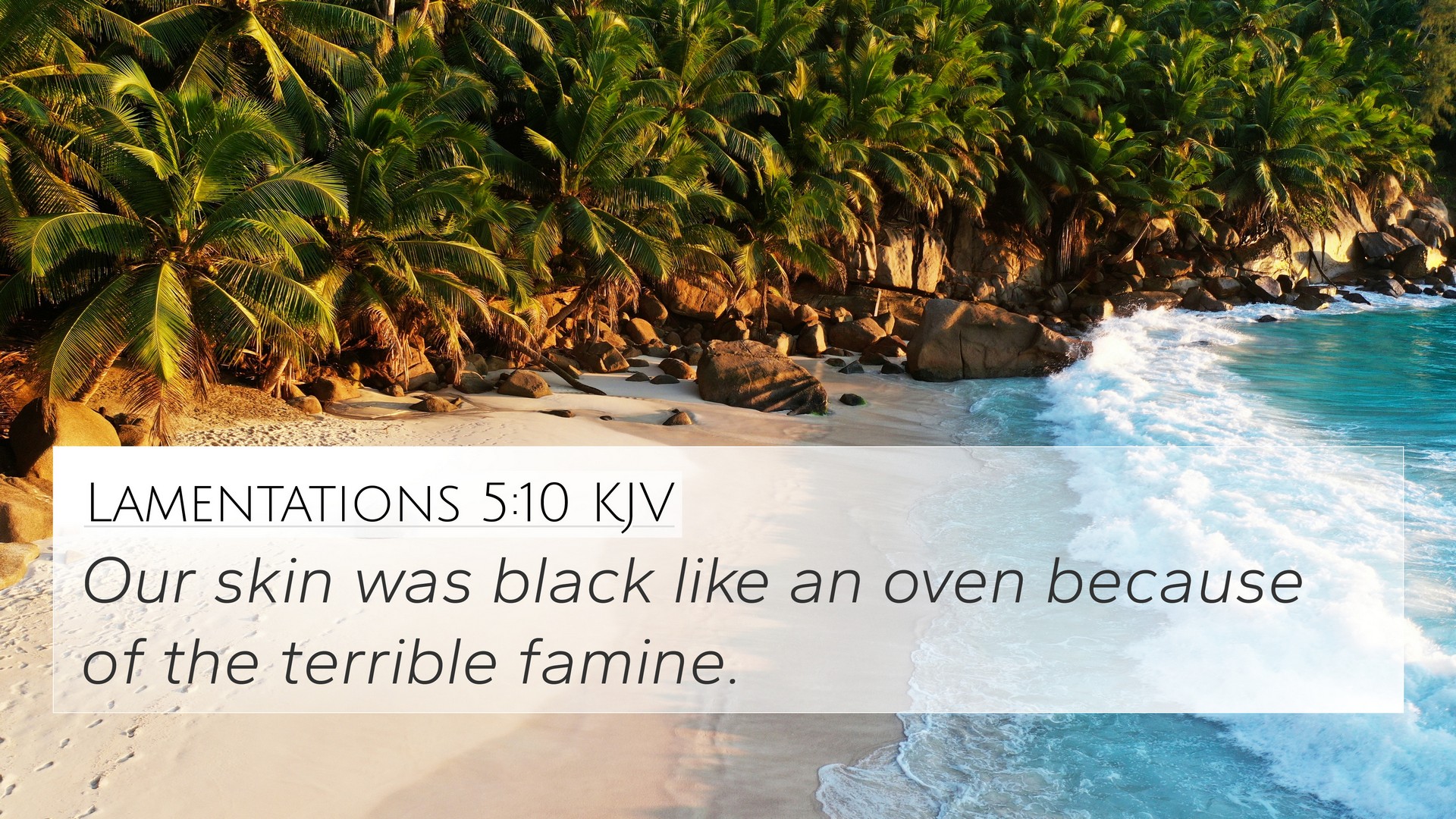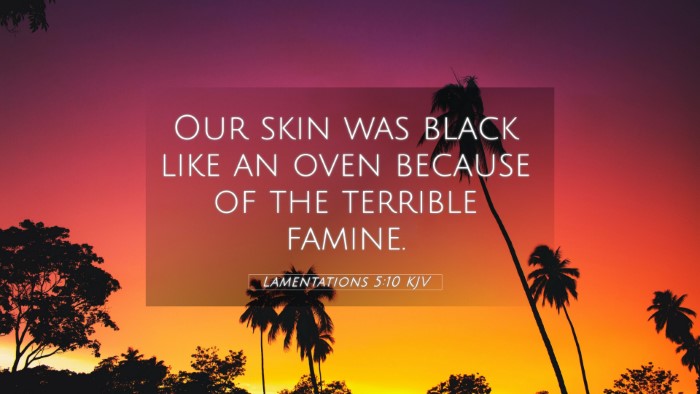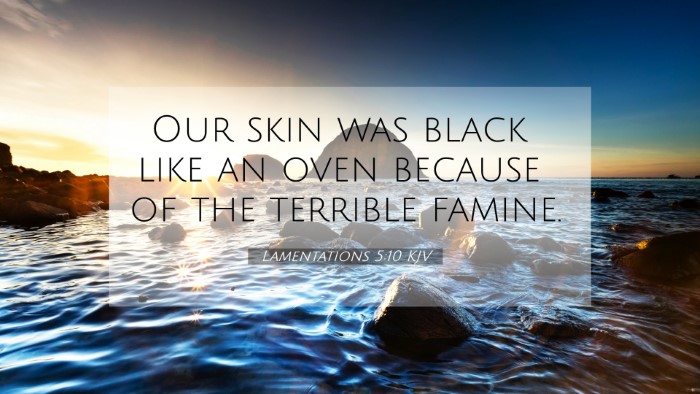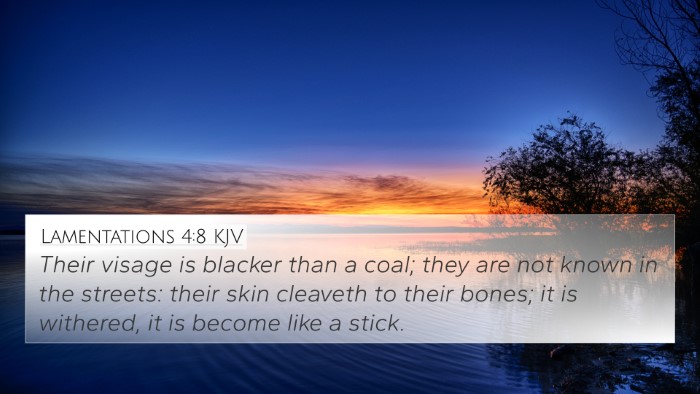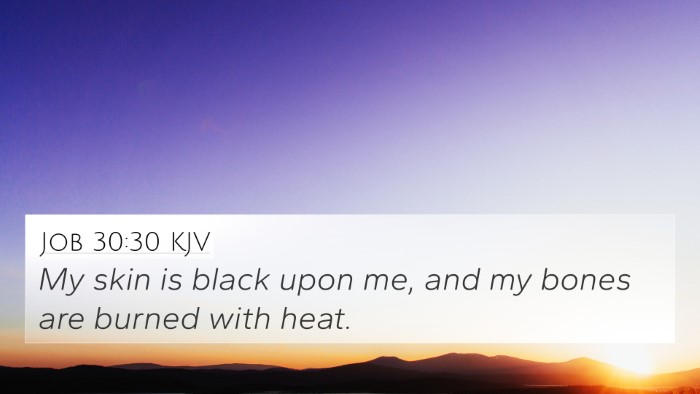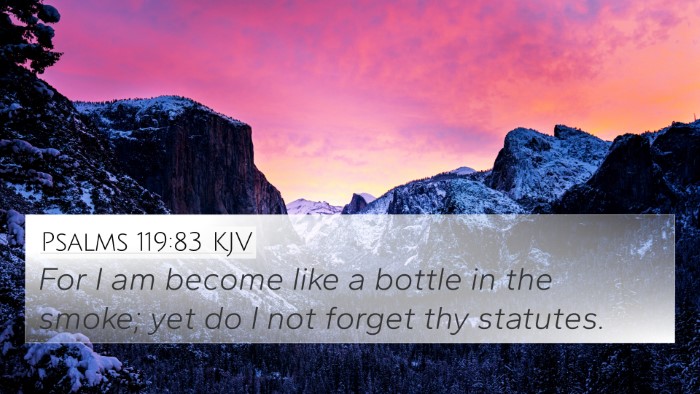Lamentations 5:10 - Summary of Meaning
Lamentations 5:10 states, "Our skin is hot like an oven because of the burning heat of famine." This verse vividly captures the suffering and distress of the people of Jerusalem during a time of great turmoil and devastation. The imagery strongly suggests not only physical hunger but also the emotional and spiritual desolation that accompanies such suffering.
This verse is part of the final chapter of Lamentations, which is a lament expressing the sorrow of the Jewish people after the destruction of Jerusalem. It showcases the harsh realities faced by the residents and the dire conditions that they endured.
Commentary Insights
The following interpretations are drawn from prominent public domain commentaries:
-
Matthew Henry emphasizes the deep sense of anguish conveyed in this verse. He notes that the reference to skin being hot like an oven indicates not only a physical affliction but also a profound feeling of despair and abandonment. Henry connects this suffering to the broader consequences of sin and disobedience to God, reflecting how sin leads to both physical and spiritual famine.
-
Albert Barnes highlights the metaphorical nature of the verse, stating that it symbolizes the intense emotional suffering that accompanies famine. Barnes suggests that the 'burning heat' serves both as a reflection of the literal heat and starvation faced by the people and also represents their inner turmoil and desolation during these dark times.
-
Adam Clarke provides a scholarly view, noting the historical context of Lamentations. He stresses that the conditions of famine heightened the people's despair, leading to feelings of hopelessness and loss. Clarke also illustrates how such imagery connects with themes of judgment and restoration that resonate throughout the Old Testament.
Cross-References for Lamentations 5:10
This verse can be connected to several other biblical passages that echo similar themes of suffering, despair, and divine judgment. Below are cross-references that enhance the understanding of Lamentations 5:10:
- Psalm 102:4-5 - "My heart is smitten, and withered like grass; so that I forget to eat my bread." This reflects a similar despair brought on by distress and hunger.
- Jeremiah 14:3-4 - The people lament in a similar context of famine, highlighting the national crisis experienced during the Babylonian siege.
- Lamentations 1:11 - "All her people sigh, they seek bread; they have given their pleasant things for meat to relieve the soul." A clear parallel illustrating the desperate conditions.
- Isaiah 51:19 - "These two things are come unto thee; who shall be sorry for thee? Desolation, and destruction, and the famine, and the sword." This verse emphasizes the calamity faced by the people of Israel through various forms of hardship.
- Ezekiel 4:16-17 - God reveals a coming famine to Ezekiel which parallels the dire situations described in Lamentations.
- James 5:4 - "Behold, the hire of the laborers who have reaped down your fields, which is of you kept back by fraud, crieth: and the cries of them which have reaped are entered into the ears of the Lord of Sabaoth." This verse connects the concept of social injustice leading to suffering.
- Matthew 25:35 - "For I was hungry, and ye gave me meat: I was thirsty, and ye gave me drink: I was a stranger, and ye took me in." This verse speaks to the responsibilities of compassion and care during times of need.
Thematic Connections
When exploring Lamentations 5:10 and its connections, several themes emerge:
- Desperation and Cry for Mercy: The cry of anguish parallels throughout the books of Lamentations and the prophetic writings, emphasizing the need for God’s mercy amidst dire circumstances.
- Consequences of Sin: The desolation faced during this period reflects the broader biblical narrative that sin leads to suffering and separation from God.
- Hope for Restoration: Despite the despair illustrated, the overarching theme in the Bible often circles back to restoration and hope for those who seek God after periods of judgment.
Understanding through Cross-Referencing
Understanding Lamentations 5:10 requires an examination of its context and the broader narrative presented in Scripture. By utilizing tools for cross-referencing, such as a bible concordance or a bible cross-reference guide, readers can uncover deeper insights and enhance their study through comparative analysis.
This approach not only aids in grasping the immediate meaning of the text but also reinforces the interconnectedness of Scripture, allowing for a comprehensive understanding of biblical themes and messages.
Conclusion
Lamentations 5:10 stands as a poignant reminder of the depths of human suffering and the longing for divine intervention. By exploring this verse through public domain commentaries and connecting it with related scriptures, believers can develop a greater appreciation for the complexities of God's word and the hope it ultimately offers.
